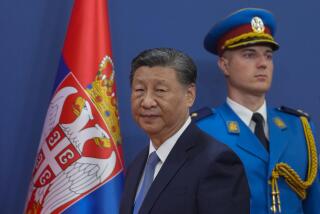Selling Out for a China Deal?
OXFORD, Britain — Good news: It looks as though the European Union will postpone lifting its embargo on arms exports to China, at least until next year. This is the right move.
The only thing wrong is that it took heavy U.S. pressure to make it happen.
Consider. Europeans claim moral superiority over George W. Bush’s America on the grounds that we always favor the peaceful resolution of conflicts and respect for human rights. Earlier this month, China’s National People’s Congress passed a law that authorizes the use of “non-peaceful means” to prevent moves toward Taiwanese independence. “Non-peaceful means” is an Orwellian euphemism for war. These are not mere words. There is a serious Chinese military buildup, directed at Taiwan.
As for human rights, Amnesty International estimates that last year “tens of thousands of people continued to be detained or imprisoned in violation of their rights to freedom of expression and association, and were at serious risk of torture or ill treatment.” Despite the occasional release of a well-known political prisoner, China’s human rights record has barely improved since the Tiananmen massacre of 1989, the event that spurred the embargo.
We are right to be outraged by abuses at Guantanamo and Abu Ghraib, because the U.S., claiming to be a beacon of freedom to the world, deserves to be judged by a higher standard. But let’s keep a sense of proportion here.
Now you may say -- and officials in Brussels, Paris and Berlin do say -- that such a reaction is naive. As it emerges from communist dictatorship, they say, this great country, with a culture and history very different from our own, is engaged in a process of modernization. We must patiently encourage positive change by dialogue, trade and constructive engagement, as we did with the Soviet Union. That is the European way: change through detente.
Fair enough. But then those officials claim that lifting the embargo is purely “symbolic.” You don’t think, they exclaim with expressions of outraged innocence, that because we propose lifting an embargo on selling arms to China we actually intend to sell arms to China? To which the only appropriate response is: Humbug and balderdash!
What happened was this: Beijing has long been irked by the embargo, for symbolic and political reasons, because it places China in a small, ignominious club with Zimbabwe and Myanmar, and because it prevents the regime from importing weapons and weapons-related technologies. In autumn 2003, the Chinese Foreign Ministry published a paper on relations with the EU, saying “the EU should lift its ban on arms sales to China at an early date so as to remove barriers to greater bilateral cooperation on defense industry and technologies.”
French President Jacques Chirac picked this up and urged the EU to oblige. Meanwhile, he declared 2004 the “year of China,” painted (or rather, illuminated) the Eiffel Tower red, backed the Chinese official position on Taiwan and failed to criticize Beijing’s record on human rights. His servility was rewarded with some trade contracts and qualified Chinese endorsement of his vision of a “multipolar” world, to counterbalance U.S. power.
The main motive for wanting to lift the arms embargo is not political but, as one senior European official put it to me, “mercantilist.” With sluggish growth and high unemployment, France and Germany are desperate to secure more export contracts from the world’s largest emerging economy. On the eve of his own wooing journey to Beijing, German Chancellor Gerhard Schroeder described this policy as an expression of “true patriotism.” Translation: Jobs for Germans take precedence over human rights for Chinese.
Sucking up -- or should we say kowtowing? -- pays off. Last year, the EU became China’s largest trading partner. The main purpose now is to get more civilian contracts, especially in the run-up to the 2008 Beijing Olympics.
But we’ll sell some arms too. In fact, we already do. Despite the embargo, in 2003 EU member states approved licenses for weapons exports to China worth nearly $500 million. And Chirac’s own defense minister has let the cat out of the bag, saying that it would be better for the Chinese to import our military technology rather than developing their own.
U.S. legislators are outraged at what they see as the prospect of French missiles being targeted at U.S. warships in the Taiwan Strait. They have threatened sanctions against European companies. It’s mainly thanks to this bruising message from Congress, as well as warnings from the Bush administration, that the EU seems set to postpone lifting the embargo.
Humbug is not a European monopoly. American firms are also desperate for more exports to China, and Washington backs them. According to a report in the Economist, about 6.7% of Chinese arms imports come from the United States, compared with 2.7% from Europe. American Humvees are produced in China for the People’s Liberation Army.
Thirty years ago, Henry Kissinger played the China card against the Soviet Union. Today, China is playing the Europe card against the United States.
Our response should not be to side unthinkingly with the U.S. but to work out, in conversations among ourselves and with the Americans, what are the basic conditions on which we will engage with the emerging dragon of the East. Even for a dragon with such a hugely attractive appetite for our exports, those minimum standards must include a commitment to the peaceful resolution of conflicts and a gradually improving respect for human rights.
More to Read
Sign up for Essential California
The most important California stories and recommendations in your inbox every morning.
You may occasionally receive promotional content from the Los Angeles Times.










